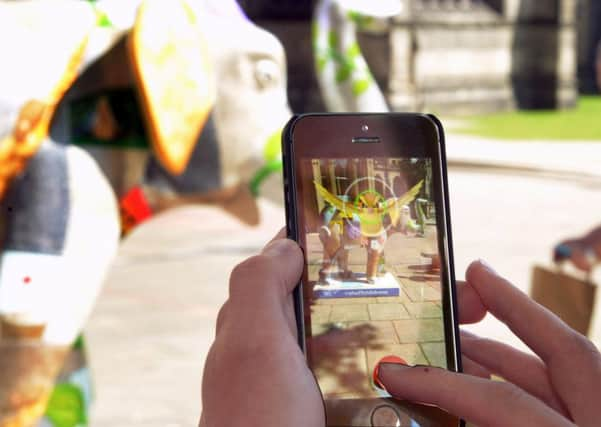Andrew Vine: Tell the addicts it's time for Pokémon Stop


As the lights turned green, and two lanes of traffic set off, four boys aged about 13 shot straight out into the road, each intent on his mobile phone, and all oblivious to the cars.
Everybody stood on their brakes and pulled up safely and away charged the lads without looking back, completely unaware of how narrow a squeak they’d had.
Advertisement
Hide AdAdvertisement
Hide AdThe driver of the car alongside mine caught my eye momentarily, and we both shook our heads in disbelief.
To those boys, what they were chasing on their mobiles was more real than the traffic bearing down on them.
Welcome to the world of Pokémon Go, the global gaming phenomenon that renders its players mindless automatons.
The pursuit and capture of cartoon characters projected onto real surroundings on the screens of mobiles has captured young imaginations like no game before it.
Advertisement
Hide AdAdvertisement
Hide AdLook around any town or city and you’ll see players completely absorbed in it to the exclusion of everything else, charging around with their eyes not on the world, the roads, or anything other than the screen and its crudely-drawn cartoons with weird names.
As I slammed on the brakes to avoid the four boys, it flitted through my mind that this was exactly what the NSPCC warned about as the craze gathered pace a couple of weeks ago.
The charity said it had child safety concerns because the young became so absorbed in the game that it blotted everything else out, including their sense of danger.
Doubtless the lifeboat crew at Hastings would agree, after being scrambled to rescue three girls who had gone into the sea chasing Pokémon characters, or the police who have stopped at least three drivers already caught playing the game at the wheel.
Advertisement
Hide AdAdvertisement
Hide AdOh, it’s all just a bit of fun, though, isn’t it? Getting young people out into the real world instead of spending the school holidays glued to a screen in their bedrooms?
Actually, no. It’s a menace, not a bit of fun at all, an anti-social, isolating, limiting obsession that far from opening up the world narrows it to the dimensions of a smartphone screen.
It’s hooking people – adults, too, but especially the young – into a degree of addiction to gaming and their phones that we haven’t seen before, in a form of mass brainwashing.
There’s a nasty whiff of the manipulative about it. The game comes free, and that feels unsettlingly like the classic ploy for tempting people into addiction – give it away at first, get them hooked and then start charging progressively more.
Advertisement
Hide AdAdvertisement
Hide AdThat it has arrived in Britain at the start of the long summer break from school only adds to the air of cynicism about it.
Six long weeks for children to be conditioned into reaching for the phone as soon as they wake up and not putting it down again until they can’t keep their eyes open.
Spare a thought for the teachers who will face running battles to get attention away from cartoons superimposed on the classroom and back to learning when the children go back next month.
There has never been anything quite so insidious at wiping out any sense of danger or appropriate behaviour as this.
Advertisement
Hide AdAdvertisement
Hide AdPeople will only wake up to how it is blanking out the normal checks and precautions of real life when something appalling happens.
Everything drilled into children about staying safe from the time they are old enough to understand appears to vanish once the hunt is on.
The craze has already claimed its first life, as the virtual world blots out the risks of the real one. In Guatemala, a young man was shot dead while trying to break into a house in pursuit of a Pokémon character.
In Japan, the authorities have been forced to plead with the game’s makers to take action to stop players going into the radioactive contaminated zone around the wreckage of the Fukushima nuclear reactor.
Advertisement
Hide AdAdvertisement
Hide AdAnd it is also wiping out any sense of respect for surroundings. Also in Japan, crowds of players have been chasing around the memorial to the victims of the atomic bomb dropped on Hiroshima. There has been a similar problem at the US Holocaust Memorial Museum in Washington.
The Pokémon Go players are being coaxed away from reality into a fantasy that is emotionally unhealthy.
Hopefully, it’s a craze that will pass, and millions of children will raise their heads and discover the world around them instead of an illusion on a screen. But don’t bank on it. Having hooked them in, the manipulators of virtual reality will want to keep them that way whilst they work out how to milk the most money from it.